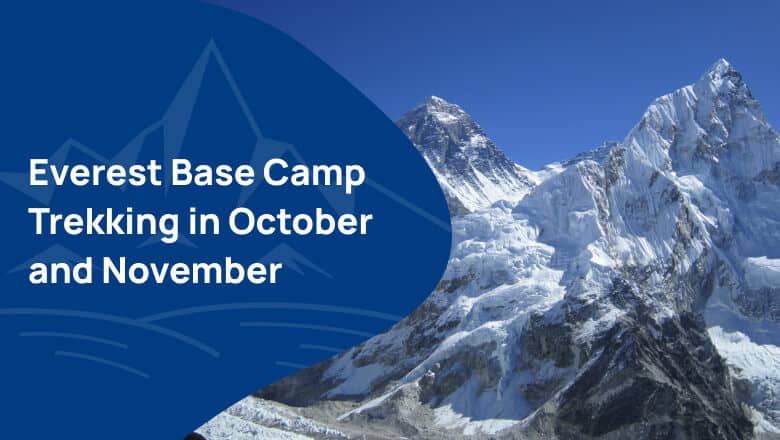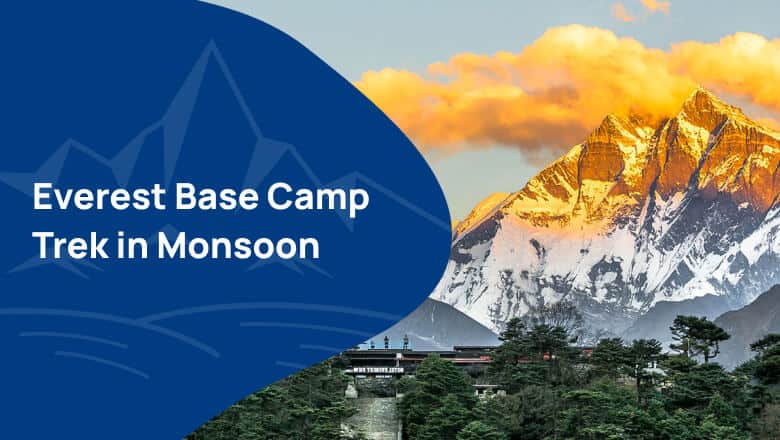The Everest Base Camp Trek is a non-technical trek that does not require any mountaineering experience, so it’s perfect for people of all ages, shapes, and sizes.
Despite being a very doable trek, the EBC trek is still a challenge. You’ll be walking for 12-14 days, covering about 80 miles and reaching an altitude of 5,364 meters at the base camp. That’s why having a good training plan is the first step toward a successful trek.
In my previous article, ‘How hard is Everest Base Camp Trek?’, I explained the challenges you’d face during the trek, such as high altitude, steep inclines, and unpredictable weather.
Following that article, today I’ll give you an overview of the broad training methods you should implement in your own time to have a safe and enjoyable experience.
Contents
- Preparing for Your Everest Base Camp Trek
- Everest Base Camp Trek
- Additional tips for training for the EBC trek
- Final words in a nutshell
- FAQs
- a. How difficult is the Everest Base Camp Trek?
- b. How fit do I need to be for the Everest Base Camp Trek?
- c. Do I need to train for the Everest Base Camp Trek?
- d. What are the things to consider while training for the Everest Base Camp Trek?
- e. Is Everest Base Camp Trek worth it?
- Get in Touch with Our Trekking Experts Today
- Our Everest Base Camp Packages
- Everest Base Camp Trek
- Everest View Trek
- Everest Panorama View Trek
- Everest Base Camp Charity Yoga Trek
- Everest Base Camp Luxury Heli Trek
Do you have any question about trip to Nepal?
Tell us about your trip to Nepal and what you expect from it. We will answer your questions in 24 hours and help you design a trip with a comfortable itinerary to meet your needs best.
Preparing for Your Everest Base Camp Trek
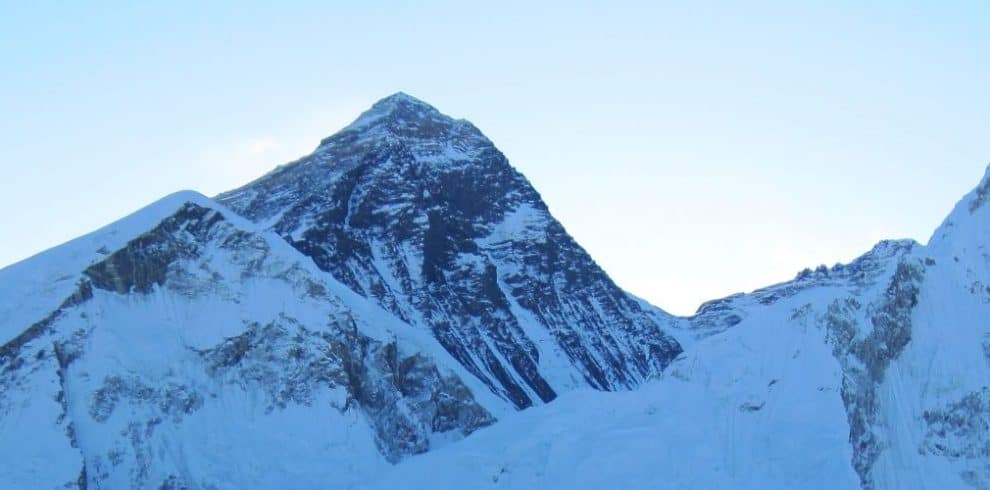
Everest Base Camp Trek is a classic trekking adventure in the foothills of the world’s highest mountain, Mount Everest. Trudging along the rugged trails of the Himalayas, decorated with mountains and landscapes, this trek is undoubtedly one of the best walks on earth. Regarded as the most popular trek in Nepal, Everest Base Camp Trek extends for 15 days. Along the way, you’ll get to marvel at some of the world’s highest massifs, including Mt. Everest, Lhotse, Ama Dablam, Thamserku, Cho Oyu, Pumori, Nuptse, and Makalu. Not only that, but this trek combines the glorious glimpses…
Given its physically challenging nature, training and adequately preparing for the EBC journey is always beneficial, even if you’re an experienced hiker.
The key point is finding your level of comfort when doing an exercise and then aiming to push that level further, which is the basic pillar of endurance training.
We will briefly discuss the basic training guidelines for Everest Base Camp Trek below:
1. Cardiovascular Training
Cardio training, also referred to as aerobic exercise, consists of activities that raise your heart and respiration rates for a sustained duration, enhancing overall stamina and heart health. This form of training is critical for high-altitude hikes like the Everest Base Camp Trek. You can choose activities you enjoy, like walking, running, cycling, or swimming, and perform them consistently 4-5 times weekly.
Gradually increase your workouts’ duration, intensity, and variety over time to continually challenge your body and build endurance. Remember to include warm-up and cool-down routines, listen to your body’s signals, and consult a healthcare professional before starting any exercise program.
2. Strength Training
Strength training, or resistance training, is a crucial component of preparing for the Everest Base Camp Trek, as it helps improve overall performance and reduces the risk of injury. Focus on exercises that target the legs, core, and upper body, which are essential for trekking. For example, leg exercises like squats, lunges, and step-ups help build lower body strength, while planks, deadlifts, and Russian twists target the core muscles.
For upper body strength, consider push-ups, pull-ups, and rows. Include various equipment, such as free weights, resistance bands, bodyweight exercises, or machines, to keep your workouts engaging and challenging. Aim for 2-3 strength training sessions per week, with at least 48 hours of rest between sessions targeting the same muscle groups.
3. Flexibility and Balance
Flexibility and balance are essential aspects of physical fitness that can enhance your trekking experience and help prevent injuries during the Everest Base Camp Trek. Flexibility refers to the range of motion around a joint, which can be improved through regular stretching exercises. Having good flexibility can make it easier to perform daily activities and reduce the risk of muscle strains or joint injuries while trekking.
In contrast, the idea of balance pertains to your ability to keep your body’s steadiness while engaging in various activities. Specifically, a strong sense of balance is imperative for hiking endeavours, as it assists you in navigating through uneven terrains and lessens the chance of tripping.
Hence, by integrating both elements of flexibility and balance into your fitness regimen, you are better prepared to tackle the physical demands of the Everest Base Camp hike. Simultaneously, this also minimizes the possibility of sustaining injuries during your adventurous journey.
4. Hiking Practice
Hiking is a crucial activity for developing the required stamina and abilities for enduring extended periods of trekking across varied landscapes, making it an integral part of the preparation process for the Everest Base Camp Trek. Regular hikes are instrumental in acclimatizing yourself to the physical expectations of the journey, such as navigating through steep trails and dealing with rugged landscapes.
Furthermore, practicing hiking allows you to become familiar with the equipment you intend to use during the trek, such as backpacks, trekking poles, and footwear, thereby guaranteeing that you are comfortable and adequately prepared for the journey. To optimize your hiking practice, aim to simulate the trekking environment as realistically as possible. Choose trails with varying elevations, terrains, and distances to boost your endurance and become more adaptable to diverse scenarios.
As part of your Everest Base Camp Trek training routine, why not consider taking on some of these enriching hikes:
- Nagarkot Hike,
- Balthali Village Trek
- Shivapuri Hill Hike,
- Phulchowki Hill Hike,
- Namobuddha Hike,
- Chandragiri Hill Hike
5. High Altitude Training
High altitude training is necessary while preparing for the Everest Base Camp Trek, as it helps your body acclimate to the reduced oxygen levels experienced at higher elevations. Acclimatization is a gradual process during which your body adapts to the lower oxygen levels and increased respiratory rate, allowing you to function more efficiently in high-altitude environments.
Moreover, proper acclimatization lowers the likelihood of altitude sickness, which can result in symptoms like headaches, nausea, dizziness, and breathlessness, and in severe instances, may be fatal.
To include high-altitude training in your preparation, attempt to spend time at higher altitudes (over 8,000 feet) before your trek, participating in activities such as hiking, camping, or merely walking. This aids in acclimatizing your body to reduced oxygen levels and reduces the chance of altitude sickness while trekking.
6. Mental Preparation
Mental readiness is also a vital aspect of preparing for the EBC trek since it aids in building the grit and determination needed to tackle the physical and emotional hurdles that may arise during the expedition.
As previously mentioned, the trek can be challenging, with extended periods of hiking, unpredictable weather, and the possibility of altitude sickness. However, mentally readying yourself for these difficulties makes it more likely for you to maintain a positive outlook and effectively handle any hurdles that come your way.
To develop your mental resilience before the trek, you can use several tactics. Some of them are:
- Visualization techniques, where you imagine yourself successfully completing the trek, can help you build confidence and reinforce a positive mindset.
- Regular practice of stress-reduction techniques, such as meditation, deep-breathing exercises, or mindfulness, can also help you stay calm and focused during challenging moments on the trek.
- Educating yourself about the trek and its challenges, setting realistic expectations, and developing contingency plans can help you feel more prepared and confident in handling the demands of the Everest Base Camp Trek.
7. Consult a Healthcare Professional
Consulting a professional healthcare provider before starting any training program, especially for a physically demanding activity like the Everest Base Camp Trek, is essential to ensure that you are in good health and capable of undertaking the challenges associated with high-altitude trekking.
A healthcare professional can assess your overall fitness level, identify any pre-existing medical conditions or concerns, and provide guidance on safely and effectively preparing for the trek.
In addition to conducting a physical examination and reviewing your medical history, your healthcare provider may recommend specific exercises, dietary changes, or modifications to your training program based on your needs and health status. They may also advise on managing existing medical conditions during the trek and preventing and recognizing symptoms of altitude sickness.
8. Create a Training Schedule
Creating a training schedule is one of the beneficial steps in preparing for the EBC trek, as it helps you structure your workouts and ensures that you consistently progress toward your fitness goals. A well-designed training schedule should include a mix of cardiovascular exercises, strength training, flexibility and balance activities, and hiking practice.
In gearing up for your trek, it’s highly recommended to create a tailored training plan based on your personal schedule, current fitness levels, and any limitations you might have. This approach will help you develop the necessary physical endurance and mental strength while reducing the chances of overexertion or injury. Start with achievable targets and progressively increase the intensity of your workouts.
For more detailed guidance, don’t forget to take a look at the associated table.
| Day | Cardiovascular Exercise | Strength Training | Flexibility and Balance | Hiking Practice |
|---|---|---|---|---|
| Monday | 30 minutes of running or cycling | 3 sets of 12 reps of lunges, squats, and calf raises | 10 minutes of yoga poses like downward dog, warrior pose, and tree pose | – |
| Tuesday | – | – | – | 1-hour hike with inclines |
| Wednesday | 30 minutes of swimming or rowing | 3 sets of 12 reps of push-ups, pull-ups, and dumbbell rows | 10 minutes of Pilates exercises like single-leg stretch and the roll-up | – |
| Thursday | – | – | – | Rest day or light stretching |
| Friday | – | – | – | 2-hour hike with inclines and declines |
| Saturday | 30 minutes of high-intensity interval training (HIIT) like jumping jacks, mountain climbers, and burpees | 3 sets of 12 reps of bench press, shoulder press, and bicep curls | 10 minutes of stretching exercises like hamstring stretches and quad stretches | – |
| Sunday | – | – | – | Rest day or light stretching |
Note – Keep in mind this is only a sample exercise routine, and it should be modified based on your personal fitness level and objectives. It’s crucial to pay attention to your body and take a break if you experience any discomfort or pain.
Additional tips for training for the EBC trek
Here are some additional tips to help you train effectively for the Everest Base Camp Trek:
- Cross-training: Incorporate different forms of exercise into your training program to target various aspects of fitness and reduce the risk of overuse injuries. Mixing activities like swimming, cycling, or yoga with your hiking and strength training can help improve your overall fitness while keeping your workouts interesting.
- Train with a backpack: Practice hiking with a loaded backpack to simulate the weight you will carry during the trek because this will help build your strength and endurance and allow you to get used to having the extra load.
- Break in your hiking boots: Wear your hiking boots during your training hikes to break them in and ensure they’re comfortable for the trek. Blisters or ill-fitting footwear can make your trek much more challenging.
- Nutrition and hydration: Focus on maintaining a healthy diet and staying well-hydrated during your training. Eating a balanced diet rich in nutrients can help support your body’s recovery and adaptation to the increased demands of your workout. Also, good hydration habits can help prevent dehydration and altitude sickness during the trek.
- Altitude simulation: Try to train at higher altitudes or use an altitude training mask to help your body acclimate to the reduced oxygen levels experienced at high elevations.
- Rest and recovery: Ensure you have sufficient rest and recovery days in your training schedule to allow your body to adapt and avoid overtraining or injury. Listen to your body and adjust your training if you experience signs of fatigue or overtraining.
- Train with a partner or group: Training with others can help keep you motivated and accountable while providing support during your preparation. Join a local hiking group or find a training partner with similar goals.
- Stay informed: Research the Everest Base Camp Trek and familiarize yourself with the route, altitude profile, and potential challenges. This knowledge can help you set realistic expectations and prepare more effectively for the trek.
By incorporating these additional tips into your training, you will be prepared better for the physical and mental demands of the Everest Base Camp Trek and increase your chances of a successful and memorable experience.
Final words in a nutshell
Preparing for the Everest Base Camp Trek involves a well-rounded training program encompassing cardiovascular fitness, strength, flexibility, and balance. At the same time, it is an exciting journey in itself; therefore, hiking practice and high-altitude training are essential to acclimate to the unique demands of the trek. Remember the importance of mental preparation, as it helps build resilience and determination to face challenges during the journey.
Before starting any training program, consult a healthcare professional to ensure you’re in good health and capable of undertaking the challenges of high-altitude trekking. Then, create a structured training schedule tailored to your fitness level and needs, and follow a comprehensive packing checklist to ensure you have all the necessary gear for the trek.
Remember to consider the additional tips mentioned, such as cross-training, proper nutrition, and partner training to enhance your preparation. By dedicating time and effort to train effectively, you will be better equipped to tackle the physical and mental challenges of the Everest Base Camp Trek, ultimately enjoying a successful and memorable experience.
Thus, embrace the challenge, and you will be rewarded with an unforgettable experience in the heart of the majestic Himalayas. Happy trekking!
FAQs
a. How difficult is the Everest Base Camp Trek?
The Everest Base Camp Trek is considered moderately complex. It’s not the technical aspects of the trek that pose a challenge, as most of the trail involves walking. However, the high altitude, the potential for extreme weather conditions, and the trek duration (typically 12-14 days of hiking for several hours each day) make it physically and mentally demanding. Factors such as personal fitness level, preparation, and how well one acclimatizes to the altitude also significantly influence the trek’s difficulty.
b. How fit do I need to be for the Everest Base Camp Trek?
Embarking on the Everest Base Camp (EBC) trek requires a certain degree of physical fitness. This involves having the capacity to walk for 5-8 hours daily across rugged landscapes, managing a backpack filled with personal items, and handling the high altitude, which surpasses 5,000 meters at the base camp. While there’s no need to be an extreme sports enthusiast, keeping yourself in good physical shape can make the trek smoother and more enjoyable.
c. Do I need to train for the Everest Base Camp Trek?
It’s strongly advised to train for the Everest Base Camp trek. Physical conditioning is essential to develop the endurance, strength, and mental toughness necessary to tackle the physical and mental rigors of the hike.
A comprehensive training regime that incorporates cardio exercises, strength workouts, and altitude acclimatization is instrumental in managing prolonged hiking days, carrying backpacks, and traversing steep, rough terrains at significant heights. Besides, adequate readiness not only ensures a more secure journey but also elevates your overall experience. This preparation empowers you to genuinely admire the splendour of the Himalayas and forge unforgettable memories.
d. What are the things to consider while training for the Everest Base Camp Trek?
When preparing for the Everest Base Camp trek, it’s vital to consider several key aspects that will assist you in coping with the physical demands of the expedition. Boosting physical endurance, acclimatizing to the high-altitude environment, and maintaining mental resilience ought to be the focal points of your training.
Developing cardiovascular fitness and endurance.
Strengthening exercises, particularly for the legs and core.
High-altitude acclimatization practices.
e. Is Everest Base Camp Trek worth it?
Absolutely, the Everest Base Camp trek is worth it. The journey offers an extraordinary experience that includes breathtaking views of the world’s highest peaks, encounters with unique cultures in the high-altitude Sherpa villages, and a sense of accomplishment from reaching the base of Mount Everest. It’s a challenging yet rewarding adventure that leaves trekkers with unforgettable memories.
Our Everest Base Camp Packages

Everest Base Camp Trek is a classic trekking adventure in the foothills of the world’s highest mountain, Mount Everest. Trudging along the rugged trails of the Himalayas, decorated with mountains and landscapes, this trek is undoubtedly one of the best walks on earth. Regarded as the most popular trek in Nepal, Everest Base Camp Trek extends for 15 days. Along the way, you’ll get to marvel at some of the world’s highest massifs, including Mt. Everest, Lhotse, Ama Dablam, Thamserku, Cho Oyu, Pumori, Nuptse, and Makalu. Not only that, but this trek combines the glorious glimpses of the Himalayas with…
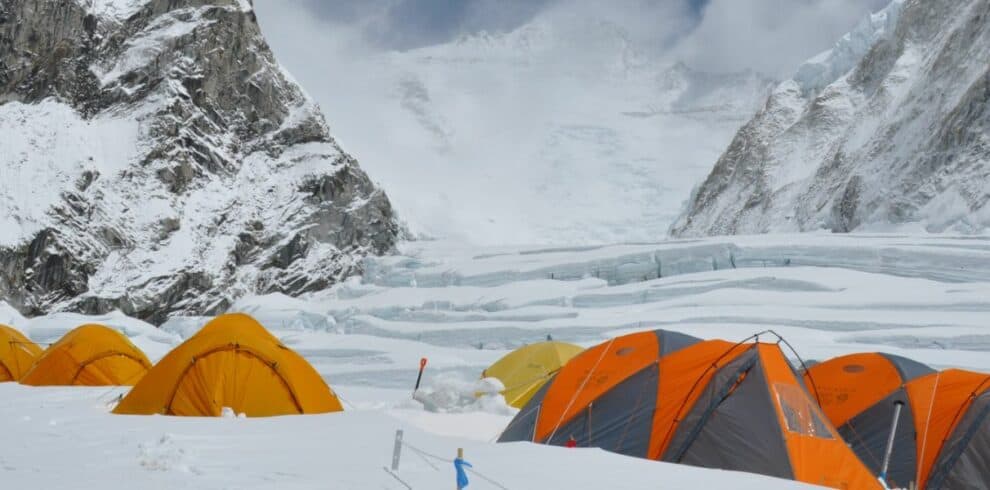
Everest View Trek is probably the most famous trek in the Himalayan region of Nepal. It is one of the most adventurous and historic trekking trails which presents you with the mesmerizing views of mighty Mt. Everest. Everest region also encircles some other magnificent peaks like Mt. Lhotse, Mt. Cho Oyu, Mt. AmaDablam and Mt. Makalu. Namche bazaar is a gateway to the Everest region. Trekking through the route, you will come across cascading waterfalls, rivers, and forests filled with rhododendron (National Flower of Nepal), pine trees, etc. You can also explore Sagarmatha National Park which is enlisted in the…
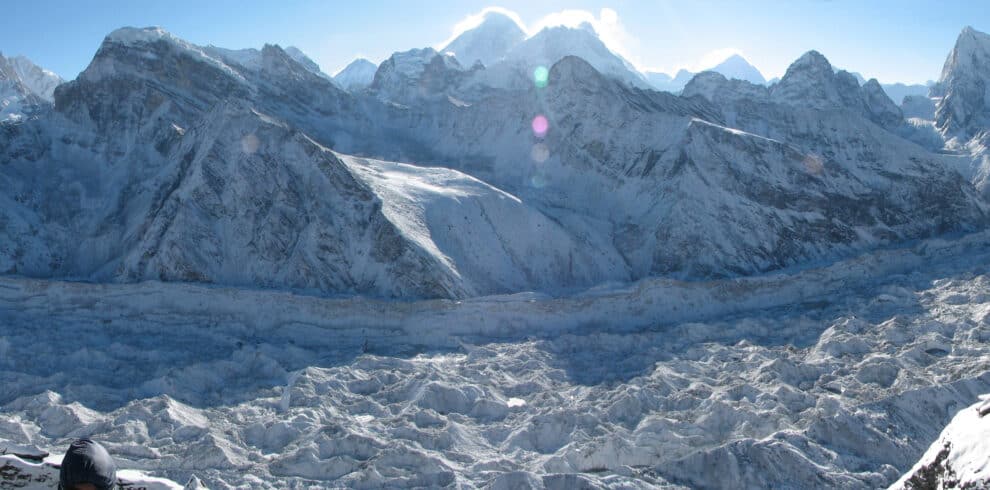
The Everest View Trek is a short trekking alternative in the Everest region. It offers stunning views of the world's highest mountain Mt. Everest (8,848 m) along with views of other Himalayan peaks such as Mt. Lhotse (8,414m), Mt. Nuptse (7,861m), Mt. Pumori (7,165m), Mt. Ama Dablam (6,856 m) among others. This trek is ideal for people who have limited time but still would like to see all that Nepal has to offer. The trek provides an opportunity to explore the lifestyle, culture, and tradition of legendary Sherpas, and to view the ancient Buddhist monasteries all the while surrounded by…
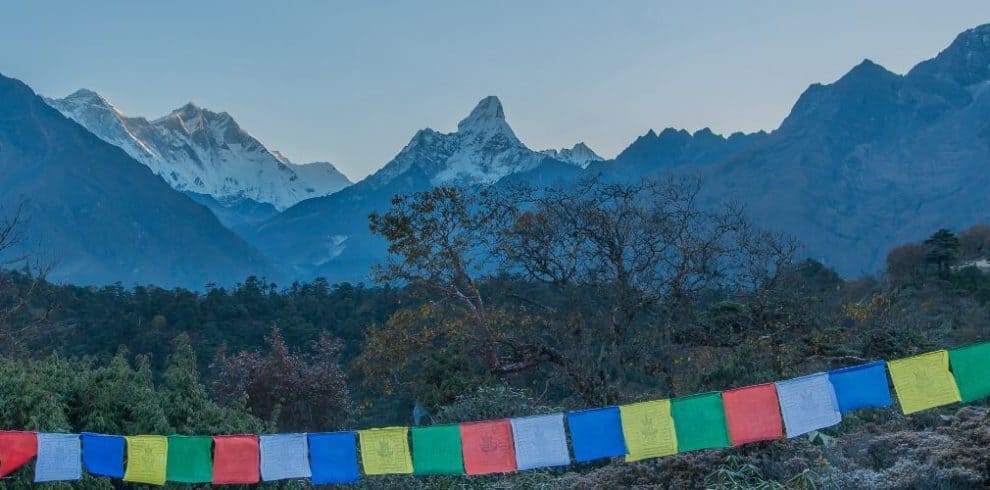
Yoga is the perfect mixture and a superb union of the delicate soul and the supreme soul. Yoga trekking integrates the natural world with one's inner self. The ideal outcome is a fulfilling experience that awakens senses for deeper awareness and greater relaxation beneath the towering Himalayas. Yoga has many varied, subtle, yet incredibly superior advantages. Strength and flexibility are enhanced. Yoga stretches your muscles and relieves low back pain, stress, and anxiety. It also makes sleeping better. Additionally, the yoga trekking program is appropriate for people of all ages and offers a once-in-a-lifetime chance to improve one's physical and…

The Everest Base Camp luxury heli Trek is designed for people who are short on time but still want to scale the base of the tallest mountain in the world. The trek is one of the most esteemed treks in the world.Towering peaks,majestic vistas, deep gorges with crystal blue rushing rivers and the wonderful Sherpa people all go to make this trek a very memorable one,We recognise that not all people have the time to complete the full trek so this trek is designed for them. The park is situated 120km northeast of Kathmandu.and has been listed by UNESCO as…



